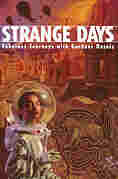This book is published for The Millennium Philcon to honor Gardner Dozois on the occasion of his being Guest of Honor.
Introductions by: Stephen Baxter, Michael Bishop, Susan Casper, Pat Cadigan, Jack Dann, Andy Duncan, Eliot Fintuschel, Joe Haldeman, James Patrick Kelly, John Kessel, Nancy Kress, George R.R. Martin, Paul McAuley, Ian McCloud, Mike Resnick, Kim Stanley Robinson, Kristine Kathryn Rusch, Robert Silverberg, Michael Swanwick, Walter Jon Williams, Connie Willis, and Jane Yolen.
Table of Contents
|
|
Published Reviews
Best known as the editor of Isaac Asimov's Science Fiction Magazine, Gardner Dozois shows off entirely different talents in this collection of short stories. Covering almost thirty years of work, Strange Days dishes up fiction about lonely, isolated people: a vampire in a concentration camp, a boy besieged by homicidal clowns, spacers seduced by the impossible Mars of Edgar Rice Burroughs... and a good deal more.
The content of this volume falls into a number of categories. The bulk of it is composed of stories, of course: some that Dozois has written solo, and others written in collaboration with other writers including Susan Casper and Michael Swanwick. Each tale is introduced by one or more well-known SF authors, essays which provide significant entertainment value in their own right, as well as offering insight into the author. Strange Days also features a lengthy travel diary which details a 1995 visit to England and Scotland for the World Science Fiction Convention.
The stories criss-cross over a range of topics and themes. "The Golden Apples of the Sun," written with Jack Dann and Michael Swanwick, is a light-hearted visit to the land of Faerie. "The Dinner Party," on the other hand, is a reflection of grim real world events, one which dissects the worst corners of the human psyche. "Community" is a cautionary tale that asks how far people will go to enforce majority views of public decency. And "Touring"—written with Michael Swanwick and Jack Dann—is a dose of nostalgia, bringing Buddy Holly, Elvis Presley and Janis Joplin together onstage long after all of them have died.
The story introductions make this book surprisingly different from most SF collections. The introductory essays by many of SF's best-known authors—Connie Willis, Jane Yolen, Eliott Fintushel, George R.R. Martin and Robert Silverberg, to name a few—give the spaces between stories a feeling like being at an SF convention. In the course of discussing a particular work, the writer will offer an anecdote about Dozois or unravel the tale's history, providing the insider stories with a delicious, gossipy feel. The introductions bring the reader close to the heart of today's SF community and a circle of friends within that world. Then, turn the page, readers plunge out of this warmth and into some intensely emotional fiction. The sense of chummy camaraderie vanishes, leaving you alone with a powerful storyteller and his often-disturbing worlds. The transitions are stark and surprising.
Even though the contents were selected in part because they are difficult to track down in other venues, readers will no doubt recognize a number of the tales in this book. Their original print appearances may have been some time ago, but Dozois stories are intensely memorable; the mixture of high-impact emotion with vivid sensory detail makes them hard to shake off, even years after an initial reading. The novella "Strangers" is particularly hard-hitting in this regard, a tragedy so vivid and haunting that it seems as if it has been around forever, that everyone must has read it.
Ultimately, the alchemy created by this mix of often-somber fiction and friendly introductions makes for a book that cannot be swallowed in a few brief sittings. Readers will want to take their time with every story, absorbing it carefully and then taking a pause to see how it goes down. In bringing these unforgettable tales into easy reach, Dozois has done readers a very good turn indeed.—Alyx Dellomonica, Locus (11/2001)

